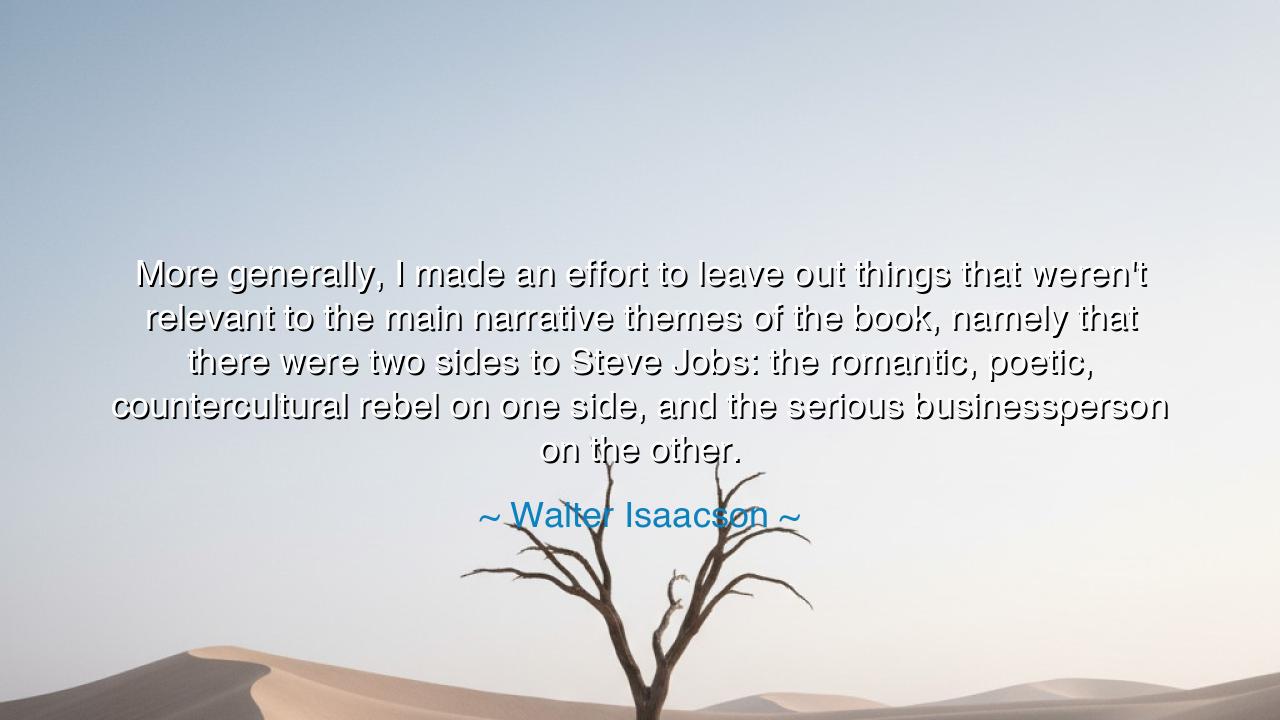
More generally, I made an effort to leave out things that weren't
More generally, I made an effort to leave out things that weren't relevant to the main narrative themes of the book, namely that there were two sides to Steve Jobs: the romantic, poetic, countercultural rebel on one side, and the serious businessperson on the other.






“More generally, I made an effort to leave out things that weren’t relevant to the main narrative themes of the book, namely that there were two sides to Steve Jobs: the romantic, poetic, countercultural rebel on one side, and the serious businessperson on the other.” So declared Walter Isaacson, chronicler of a life both brilliant and tumultuous. In these words lies not only a reflection upon one man, but upon the eternal duality of human nature itself. For every soul is divided between dream and discipline, between the yearning of the spirit and the demands of the world.
The romantic within Jobs was no mere adornment, but the spark that set his imagination aflame. It was this side that saw beauty in typography, elegance in design, and harmony between man and machine. He was, in this way, not unlike the poets of old who saw gods hidden in every stream, or the mystics who found infinity in a single star. Jobs’s poetic rebellion against mediocrity was the wellspring of his creativity. He dared to dream of machines that were not cold instruments, but companions of human thought, crafted with grace and spirit.
Yet standing beside the dreamer was the stern businessperson—a figure relentless, demanding, unyielding. This was the Jobs who struck bargains, clashed with rivals, and demanded perfection from his teams. Without this side, his dreams would have dissolved into clouds, admired perhaps, but never built. It was discipline that gave his visions flesh, structure that gave his poetry form. Thus we see that greatness is not born of rebellion alone, nor of order alone, but of the uneasy marriage between them.
History is filled with such dual figures. Consider Leonardo da Vinci: at once an artist of ethereal visions and a scientist of rigorous inquiry. In him too dwelt the romantic poet sketching angels and madonnas, and the businessperson-engineer designing weapons for dukes and kings. His genius endured because he walked with both feet—one planted in imagination, the other in pragmatism. Jobs stands in this lineage, a modern heir to the eternal struggle of the human spirit: to dream as gods dream, yet to labor as mortals must labor.
Isaacson’s words remind us that biography is not the telling of every detail, but the shaping of a narrative that reveals essence. By focusing on Jobs’s duality—countercultural rebel and serious businessperson—he captured the heart of a life that otherwise might have seemed chaotic. For what is a life if not the weaving together of opposites, the balancing of fire and stone, wind and earth? In telling this story, Isaacson teaches us not merely about one man, but about the pattern of greatness itself.
From this teaching, let us draw wisdom for our own lives. Do not scorn the romantic, poetic dreamer within you, for it is this voice that whispers of beauty, of higher purpose, of a world remade. But neither should you neglect the stern businessperson, for without discipline and endurance, dreams perish like flowers in winter. Hold both within yourself, and let them temper one another: the dreamer will keep you inspired, the pragmatist will keep you steadfast.
Practical action follows naturally: when you feel yourself lost in dreams, ask how they may be given form; when you are buried in routine, pause and ask if you have forgotten beauty. In this balance lies not only achievement but fulfillment. As Steve Jobs showed, to live divided is not weakness, but strength—if one has the courage to unite the halves.
So, children of tomorrow, remember Isaacson’s teaching. Do not chase only rebellion, nor worship only order. Walk with both: the romantic rebel who dares to imagine, and the serious builder who dares to make real. For it is in the union of these two sides that lives of legend are forged, and that ordinary men and women touch eternity.






AAdministratorAdministrator
Welcome, honored guests. Please leave a comment, we will respond soon